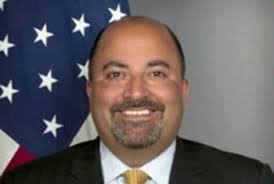As published in Asian Tribune, June 26, 2015
By Daya Gamage
Sri Lanka and Israel have been both accused of violating international humanitarian law (IHL) and international human rights law (IHRL) at UN Human Rights Commission in Geneva, but in dealing with these two nations the United States has taken two contradictory positions: the US has supported the Israeli decision to boycott the UNHRC sessions that discuss Israeli violations while the US was critical of the previous Rajapaksa regime’s decision to maintain a distance from the Geneva process.
Israel refused entry to a UNHRC official for investigation of alleged violations in the Gaza Strip during its battle with Hamas.
In fact, the US sponsored three resolutions critical the manner in which Sri Lanka handled the final stages of the military battle against the secessionist Tamil Tigers bringing accountability and transparency into the debate and deliberations.

The American ambassador-designate to Sri Lanka Atul Keshap who visited Colombo in June 2014 as deputy assistant secretary in the South Asia Bureau was critical of Sri Lanka’s Rajapaksa administration’s decision to keep a distance from the UNHRC.
“Sri Lanka risked joining the likes of North Korea, Iran and Syria by refusing to cooperate with international probes”, said Atul Keshap, during his three day visit to Sri Lanka, in an interview with the DailyFT, a Sri Lankan media outlet.
“It is concerning to me that a country with a long democratic tradition is currently in very select company with North Korea and Iran and Syria and other notorious human rights violators in categorically refusing to work with the OHCHR investigation,” Mr Keshap said, reportedly expressing dismay at the Sri Lankan parliament’s vote against cooperation with the inquiry.
Previously, Sri Lanka parliament carried a resolution condemning the UNHRC process against Sri Lanka refusing to cooperate with Geneva.
Mr. Keshap questioned “Does Sri Lanka want to be seen in that company? Is that consistent with the vision of where Sri Lanka sees itself in world affairs?” he added, drawing attention to other US concerns over Sri Lanka’s lack of progress towards a feasible political solution to share power with the Tamil community.
Atul Keshap testified before the US Senate Foreign Affairs Committee on June 23 before confirmation as the new American ambassador to Sri Lanka.
The US on March 23 affirmed that it stands with Israel at the United Nations Human Rights Council and opposes biased actions by that body against the Jewish state.
It therefore plans to continue to oppose the UNHRC mandate to use Agenda Item 7 to debate Israeli violations of human rights at every session. There is no such mandate to repeatedly censure any other country.
“The United States strongly and unequivocally opposes the very existence of Agenda Item 7 and any HRC resolutions that come from it,” the US Ambassador to the UNHRC Keith Harper said on March 23.
He explained that his country had joined Israel in boycotting the debate.
The Israel’s position was the UN Human Rights Council has proven itself blatantly anti-Israel time and time again. Israel said in November 2014 that it wanted to investigate the Jewish State for alleged “war crimes,” but Israel refuses to subject itself to the Council which it branded as UN’s “kangaroo court.”
Israel last year decided to bar the entry of a UN commission of inquiry, which is in the region ostensibly to investigate alleged war crimes committed by the Jewish state during Operation Protective Edge. Israel said that the Commission had no intention of investigating Hamas terror against Israel’s civilian population.
Israel’s foreign ministry officially announced on 13 November 2014 that it had no intention of cooperating with a UN Human Rights Council (UNHRC) probe.
In a statement to the media, the foreign ministry said it already is obvious that the probe would find Israel guilty. The commission’s mandate focuses on Israeli actions rather than on those of Hamas, and the Council itself has a history of hostile action toward Israel.
Aware of this situation, deputy assistant secretary Atul Keshap put his foot in his mouth when he gave a media interview in June last year in Colombo criticizing Sri Lanka’s decision to distance itself from Geneva and adopting a resolution in the parliament refusing to cooperate with the UNHRC. Mr. Keshap put Sri Lanka in the category of North Korea, Iran and Syria who previously refused to cooperate with Geneva.
The Israel non-cooperation and boycott had been brewing from the year 2013, and when Mr. Keshap made the statement in Colombo in June 2014 he was aware of the US position of supporting Tel Aviv’s decision of non-cooperation with Geneva.
Mr. Keshap will soon arrive in Colombo to assume duties as America’s envoy to ‘guide’ Sri Lanka on Super Power’s ‘preferred path’.
– Asian Tribune –
All copyrights belong to Asian Tribune
One thought on “US Double Standards on UNHRC treatment: Sri Lanka & Israel”